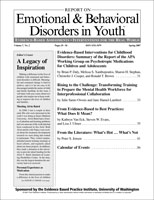Enhancing Wraparound With Empirically Supported Practices Using the Managing and Adapting Practice (MAP) System
Author: Eric J. Bruns .; Janet S. Walker.; Bruce F. Chorpita.; Eric Daleiden.
Source: Volume 13, Number 01, Winter 2013 , pp.1-7(7)

next article > |return to table of contents
Abstract:
During the past two decades, the wraparound process has become a central element in efforts to reform children’s mental health care, especially for youths with the most complex and overlapping needs. Wraparound has proven to be extremely popular among the children and families who are served in wraparound programs and initiatives, and its evidence base continues to grow. Although most published controlled studies on wraparound are quasi-experimental rather than randomized, findings are encouraging, especially for residential, family, and cost outcomes, where significant, medium-sized effects have been found across a range of studies.Keywords: evidence-based practices; MESTs (manualized empirically supported programs); PracticeWise Evidence-Based Services (PWEBS) Database; Wraparound-Specific Dashboard
Affiliations:
1: University of Washington; 2: Portland State University; 3: University of California; 4: PracticeWise, LLC.